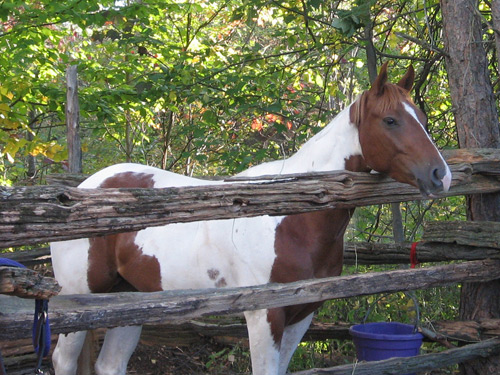U of G Researchers First to Identify a Family of Intersex Horses
March 29, 2010 - News Release
Koko the horse appeared to be a typical mare, but when she became overly aggressive and tried to mount other mares, her owner became suspicious. After a barrage of tests at the Ontario Veterinary College, researchers discovered that Koko was, in fact, a male horse that appeared to be female.
The scientists tested Koko’s relatives and found that her sister Sequoia and her cousin Pandora were also intersex.
Researchers Allan King, Tracey Chenier and Daniel Villagomez are the first to identify a family of horses with a rare genetic abnormality called pseudo-hermaphroditism, which causes genetically male horses to appear female on the outside.
This discovery has caught the attention of media across the country and has been featured in Macleans.ca, CBC.ca, Yahoo News, AOL News, CTV.ca and several other radio, print and online media.
Initially, they thought Koko had an ovarian tumour, which can cause mares to exhibit stallion-like behaviour because of heightened levels of testosterone. But when they examined the animal’s reproductive system, the researchers found Koko had internal testes.
“It was a very exciting discovery,” said Chenier. “To be expecting a tumour but discover an entirely different internal system than anticipated sparked a lot of questions.”
The research team then conducted a karyotype analysis, which is a detailed study of an animal’s chromosomes, and results showed that Koko had a male genotype (XY).
“Because these horses are from the same family line, the condition is likely a genetically heritable one,” said Chenier. “A very similar condition can occur in humans with what is known as androgen insensitivity syndrome. It’s linked recessively to the X chromosome and passed through the female line.”
The researchers suspect Koko’s mother has a mutation on her X chromosome that causes male offspring to appear female. Female offspring show no abnormalities but can, in turn, pass it on to their male offspring.
Currently, the team of researchers is looking for the genetic mutation that would cause androgen receptors – those that respond to the male hormones that are responsible for secondary sex characteristics – to be underactive.
Once the mutation is located, a better tool could be developed to test animals suspected of having the condition.
“We are studying the DNA, molecule by molecule, to try and determine what the mutation is and how we can more easily diagnose this disorder in horses,” said King.
After realizing Koko had internal testes, researchers performed surgery to remove them in the hope that she would become less aggressive.
“Before the surgery she was so aggressive that it was too dangerous to ride her,” said the owner Sam Campbell. “But she is completely different now. She is an incredibly lovely horse.”
Since then both Sequoia and Pandora have undergone the same procedure at the Ontario Veterinary College.
Although sex development disorders are rare, two racing standardbred horses in the United States were recently diagnosed with a similar intersex condition. The two animals turned out to be related to one another, but not to the horses found in Ontario, said King.
The two cases in the U.S. were discovered after repeated drug tests found high testosterone levels.
"It was initially assumed the high levels of testosterone were due to steroid use, but when examined more closely it was determined the horses had an intersex condition."
Finding related horses with this condition raises questions about how common this genetic abnormality is and whether it is fair for horses with this condition to race, he added.
"Nobody knows who they should race against - fillies or colts."

Contact:
Prof. Allan King
Department of Biomedical Sciences
519-824-4120, Ext. 54927
waking@ovc.uoguelph.ca
Prof. Tracey Chenier
Department of Population Medicine
519-824-4120, Ext. 54789
tchenier@uoguelph.ca
For media questions, contact Communications and Public Affairs: Lori Bona Hunt, 519-824-4120, Ext. 53338, or l.hunt@exec.uoguelph.ca or Deirdre Healey, Ext. 56982 or d.healey@exec.uoguelph.ca.